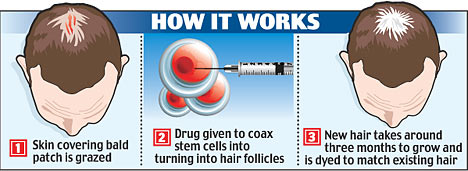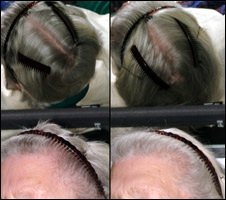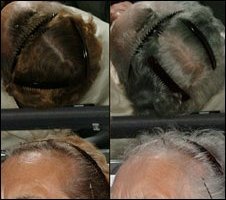Hair loss is influenced by the transformation of testosterone
20.01.2010 in HAIR LOSS SCIENCE
An estimated 50 million men and 25 million women suffer from hair loss in the United States. Unfortunately for men, high testosterone is one of the main reasons for hair loss, and therefore that is why women don’t have hair loss problems nearly as often as men. Furthermore, some women who have too much testosterone can shed hair in a patterned manner. However, testosterone itself does not cause hair loss. Hair loss is influenced by the transformation of testosterone into dihydrotestosterone (DHT).
The enzyme 5-alpha reductase ( 5 AR) converts testosterone to DHT. The enzyme 5 AR is produced in the prostate, various adrenal glands, and the scalp. DHT acts by binding to special receptor sites on the cells of the hair follicles to cause the specific changes associated with balding. Over time, the action of DHT causes the hair follicle to shed faster by shortening the anagen phase. DHT successively diminishes or miniaturizes follicle size, producing ever weaker hairs. With a steadily shorter anagen growing cycle, more hair is shed with the hair getting thinner and thinner until they become too fine to survive daily wear and tear. Add to this a hereditary predisposition to hair loss, and chances are that over time, the hair will thin and lead to baldness. Genetics plays a major role in the expression of the 5-alpha reductase enzyme, which converts testosterone to the hair-altering compound dihydrotestosterone, leading to a family trait that has a tendency towards balding.
One should keep in mind that the presence of the necessary genes and hormones are not, in on themselves sufficient to cause baldness. The reaction also requires time of exposure of susceptible hair follicles to the hormone for hair loss to begin. The time required for this to start varies from one individual to another and is related to a person’s genetic expression and sometimes to the levels of testosterone in his bloodstream. When a man experiences male pattern baldness, it appears that the hair follicles on his head have an extreme response and sensitivity to DHT. The follicles get broken to the point that they are no longer capable of producing hair.
Do you have Hair Loss Problems, read our Hair Loss Help













